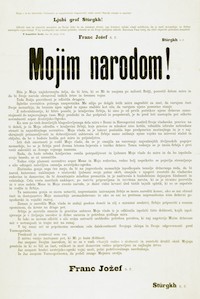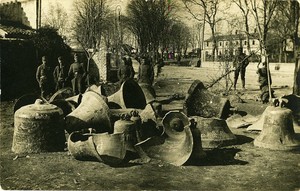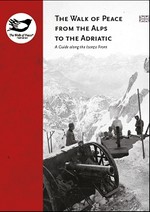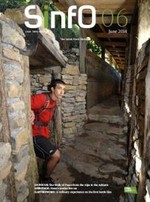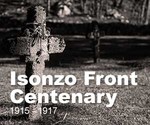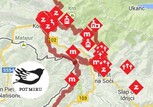"Years of Horror" 1914–1918
This is how Ivan Cankar labelled the Great War, this historical watershed between two eras, delineated between 1914 and 1918, something which had to be understood and debated before finally certain conclusions could be reached so as to prepare to enter a new era.
What triggered this massive avalanche of international proportions, coming down inevitably upon European nations and for four years sweeping away all who stood in its path? Was it perhaps because countries and nations, which had for decades been divided by deep economic crisis and political conflicts, had become insatiably selfish? Dark clouds casting their shadows pushed countries into an arms race to build up their armies. Technical inventions of recent decades – the latest weapons, guns, airplanes, submarines, airships, the wireless telegram – all getting ready to fight a war. Countries formed and broke off alliances. Europe and the world looked like a village where the neighbours were having a dispute, where no one could trust anyone else. Meanwhile, Death was waiting to do his cruel work, sending the army, disease and hunger, greed, cruelty, brutality, terror and lies. Against this, the merciless army met resistance in heroism, self-sacrifice, fervent faith and compassion. The great fight began with the battlefield encompassing land, sea and air. Many thought that the war was to end soon, even before Christmas; economic experts and numerous scientists even argued it would take Europe only two months before becoming exhausted, with neither the food nor the money to prolong the fight. But the war showed no end in sight, and it became only a question of who could last the longer.
The war dramatically changed the map of Europe and drained its economic power
Wars have always been the most active indicators for a variety of changes, and World War I confirmed this by first and foremost shaking the roots of Europe, and subsequently indeed the other continents of the world. The war dramatically changed the map of Europe, with peace treaties and conferences representing a victory for former national "minorities" that in spite of integration into multinational states had not lost the awareness of their identity; during the war, national awareness increasingly strengthened and ultimately won. Ten countries, of which eight were newly created, emerged from territory which in 1914 was still dominated by three great European empires. With the destruction of old borders and before final recognition of new ones, old political regimes in defeated countries fell, while in victorious countries they would remain in place. World War I thus brought profound changes to international relations.
Violent and horrific wartime developments inflamed the rage of soldiers and released their basest instincts; the war mocked international war and neutrality law, twisting and trampling on all the established rules. The war awakened in people one great desire: that it would be the last. But the future showed that this was an illusion, and indeed its long duration was already suggesting that people were deluding themselves.
The war mobilised and drained economic power from Europe, cutting off the trade routes. Countries impeded free trade with requisition policies and price controls, prohibiting exports and imports; moreover, a state became a buyer and a provider of raw materials. On the other hand, this strengthened non-European countries such as the USA and Japan. Not only did four and a half years of devastating war push the economy to its knees: with almost ten million casualties and several hundred thousand mutilated soldiers, it also caused a real demographic catastrophe. The economy of European countries was deprived of its main workforce. At the end of war, Europe plunged into an economic crisis and its grip could only be released with help of non-European countries that were not directly affected by war devastation; thus Europe faced a new economic challenge – how to shift from a war economy, where everything was devoted to destruction, to a peacetime economy.
The war took its toll on social life too: property was redistributed, mainly into the hands of war industrialists. Inflation prompted a huge jump in prices and a growing shortage of basic consumer goods; the standard of living for people from all walks of life was reduced and changed, and workers’ wages did not keep pace with the rising cost of living. Even the middle class could not avoid the toll that the war took on everyone; many were pushed into poverty, while war-profiteers grew rich. Above all, the war affected the rural population, where the change to the population structure was most strongly felt. For rural men, military service could no longer be deferred; the infantry, mostly composed of young and middle-aged farm labourers, suffered a higher death toll than other branches of the armed forces. Hence farming fell onto the shoulders of women, children and the elderly. Fields turned into a battlefield full of military dirt and did not recover until long after the end of the war.
Defending great values - homeland, religion, emperor and family
During the war, soldiers defended great values – homeland, religion, emperor and family. In evoking all sorts of passion, religion was a shelter and consolation for both solder and civilian. Similarly to the war world rotating between the front line and the rear areas, the spiritual world was also caught between love and propaganda, religious and patriotic enthusiasm, death and grief, joy and disappointment, fear and courage, the emotions of men and women. Religion was put to a severe test and the war even threatened the unity of the Catholic Church. Every day, combating soldiers prayed to God to help them survive the brutal war in the face of various temptations. Meanwhile, however, the situation was not so problematic for the Protestant Church, since its strong ties with the state made it easier to feel the national idea merged with religious solidarity. Following the victory of the October Revolution, the Orthodox Church experienced a deep crisis. The war also brought new elements into the Zionist movement of Central and East European Jewish communities; in particular, it offered an opportunity to realise the aspirations of their movement. Last but not least, World War I was a "holy war" to achieve "just peace" – to win over absolute evil.
For intellectual movements, the First World War was also a turning point.
Because of the mobilisation, intellectuals had to put on hold research and creative work. Following its own, unpredictable, laws, the war awakened various feelings and thoughts and, suddenly, it had to transform itself from oppressor into an originator of ideas. Its power encouraged creative imagination and developed artistic gifts. Science was afforded the opportunity to "advance" in those areas that would directly contribute to the final outcome of the war. In literature, meanwhile, literary dialogue was discontinued while influencing the development of new genres; mainly war literature flourished in all the combatant counties. Like other art-forms, the world of music and art also experienced difficult times; groping in the dark and uncertainty marked the war period and its aftermath. Young artists were dealing with restlessness and, in times of confused passions, the young generation longed for profound changes to edge away from the tradition and the past. New directions opened up in philosophical thinking too. The war brought about confusion and uncertainty among historians; to make scientific work undisputable, one needs to rise above political and national prejudice, above the complicated and unclear present that spread hatred and vengefulness among nations and countries while boosting national pride and scorn. It ruined the spirit and creativeness of a large part of intelligentsia and condemned many intellectuals to silence because they refused to sacrifice their ideals in the face of current passions or to succumb to propaganda. Looking at big events should allow the evaluation of responses to the war. But were the historians who were, after to the war, enriched with new life experience, able to understand and explain the past? A new era, new political relations and the changing world called upon them to do their "duty", but an unburdened disclosure of the past drifted further and further away.
The old world shook
The old world shook; however, while radically changing the political and social map of Europe and intentionally or unintentionally paving the way to a "new order"; military forces and political institutions also strived to maintain and consolidate the old social and state hierarchy as they believed mainly in the power of the army and economy. Consequently, various contradictory concepts that we associate with World War I – freedom and imperialism, democracy and military expansionism, war of fair borders and wars of conquest – found in it a peculiar balance. Without embarrassment, we can say of World War I that it was many wars in one. It was a fight of different principles, ideological concepts, political and social promises; and while the military conflict uninterruptedly ran its course by its own internal rules, heaped-up ideological, territorial and social difficulties made prospects for peace difficult and anticipated an even more uncertain future. The war was a clash between old and new technologies; even if the heavy, slow, boring infantry holding in their hands the victorious weapon had its say on the battlefields, it was the aviation that sparked the imagination of civilians. Every soldier, every army, every country entered the war with its own history, with an idea of itself and its opponents, with a different level of economic, technical and organisational development. This was an industrial war that should have been won by the one dropping on the enemy the largest number of bombs from planes and cannons. Those who could not keep up with technologically advanced opponents compensated for the deficit with new soldiers, who were ruthlessly packed into trenches. In this context, World War I was a trench warfare war, the most significant and recognisable image of massive human killings. For four years, the trench came to be home for the solider, where the immobility represented normal conditions for an infantryman who was condemned to passivity; hence the ensuing virtues that marked and distinguished the foot soldier: endurance, patience, resilience, but also obsession, madness, mental disorder, which were caused by everyday encounters with death.
The war was not only fought by inexhaustible but exhausted armies, their staff quarters, politicians, it was also fought by civilians on the internal front. World War I turned out to be a total war, deeply affecting the lives, habits and customs of the civilian population. The image and the role of the woman also changed, as the departure of men to the front "allowed" their emancipation – all of a sudden, the woman was left to deal with all the men’s chores, become the head of the family, the only breadwinner left to the household, fighting for household benefits. Many people were chased from their homes due to the military plans envisaging there being a front there. There was a strong bond between an internal and battle front – opaque streams of letters, postcards, messages, usually with sparing words. Both soldiers and their families felt the need to survive in the world they were forced to leave behind; the army of soldiers with poor literacy suddenly took a pen to confess, write diaries and describe what was going on around them and the emotions they were dealing with. Soldiers and civilians were accompanied by propaganda that encouraged and persuaded, communicated and changed news to make people believe in the necessity and fairness of the long war.
Entire provinces and countries changed, since they became a new "homeland" of the mixed army men who spoke different languages and dialects, were of different religions, wore different uniforms; they turned into the crossroads of military roads and railways, stations and camps. The Great War exceeded the limits of the imaginary world – "great" because the bloody drama did not take place only on the battlefield, but also affected human emotions and experiences, drew an opinion line between the old and the new, and changed the attitude to death. It became an everyday reality and almost caused no pain.
On 11 November 1918, the world was overwhelmed with the joy of winning the last war. It celebrated first the truce and then the victory; in the meantime, an army of diplomats was shaping the image of the future world, a society of nations, and signing agreements to secure a century of peace.
But who was the actual winner?
Adapted from: SVOLJŠAK, Petra. "Leta strahote" ("Years of Horror"). In Slovenska kronika XX. stoletja (Slovene Chronicle of the Twentieth Century). Ljubljana: Nova revija, 1997. Volume 1, pp. 149–151.

